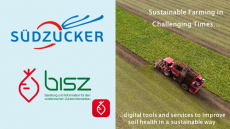Post-Brexit trade in sugar: ‘The UK market should reflect UK interest,’ say Tate & Lyle

Those were the comments of Gerald Mason, senior vice president of the British-based multinational agribusiness, who was part of an invited industry panel looking to investigate the effects Brexit would have on the sugar industry.
Speaking at the UK Environment, Food and Rural Affairs Select Committee, Mason said, “Any normal business would have the choice as to who it buys its raw materials from. Factors such as quality, sustainability, timing of deliveries influence that choice.”
“We think this is a great opportunity to have a sugar market in the UK that reflects the UK’s interests.”
“I think the UK has an opportunity to go from being a net importer of sugar to go back to being an important net exporter.”
Liberalisation..up to a point
Committee Chairman Neil Parish went on to discuss the liberalisation of the sugar market, opened up after the events of Brexit, which could invite the trade with Least Developed Countries (LDC) and countries from the African Caribbean and Pacific (ACP).
Mason dismissed this as unlikely arguing that the EU currently produces a surplus of sugar, causing the price of sugar to become competitive, partly driven by the free market price.
“The sugar that comes from the LCD and ACP countries has already collapsed in the last few years,” he said.
“Around 1.7m tonnes of raw cane sugar was coming into the EU from these countries. This year we expect it to be 0.5m tonnes. This is due to the countries’ decision to sell its sugar to more remunerative markets.
“The issue for us is that Europe is creating an environment, where the white sugar price is low but the raw sugar price is very high. We can’t buy high and sell low.”
The panel, which included Dr Mark Carr, CEO of AB Sugar, Simon O'Mahony, vice chairman of the Sugar Association of London and Professor Jack Winkler, emeritus professor of nutrition policy at London Metropolitan University, were in no doubt how complicated a situation Brexit was not just for the sugar industry but from a public health point of view.
Professor Winkler, an outspoken critic of the food and drink industry in the past, spoke initially of the kind of trade agreements the UK would need to make not just with the EU but worldwide.
However, he saved his focus for the health consequences saying, “The second issue is UK sugar consumption. For me it is gratifying that the current government has taken this on board.
“However, DEFRA has not engaged with recommendations. It is still in the business of trying to help farmers produce more sugar and lower prices for consumers.
“If they do take practical action, then we will need less sugar in the UK and that would affect the competitiveness.
“Trade liberalisation is the worst thing that could happen from a public health point of view. It would lower the price and increase the volume of sugar. We need the opposite.”
Single market exit
Taking a committee question concerning an effective future trade agreement if the UK left the single market, Mason highlighted the ‘rules of origin’ challenge.
This term refers to whether a product is truly from the UK when it benefits from a trade preference like a free trade agreement.
“Not only does the EU protect its beet farmers with very high tariffs but has very restrictive rules of origin around sugar,” he explained.
“From our perspective, we wouldn’t want to see a situation where unlimited sugar would come from the EU to the UK, that in return our sugar would be barred from going back to Europe. That would be a worse situation for us.”
Dr Carr added his thoughts as to how he saw Brexit pan out adding, “In a Brexit scenario, it really depends on whether there is free trade between the UK and EU27.”
“As long as the tariffs are reciprocal, I don’t see too much change. Clearly the extent to which the tariffs would be put in place would then determine how the whole new balance that supplies the UK market actually ends up.”
Sugar predictions
In summing up, the panel were asked what trends they predicted in the sugar market over the next ten years.
“Consumption of sugar is growing by 2-3 million tonnes a year. That’s going to continue. In China, they consume about 10 kilos a head. In the UK it’s about 30-odd kilos a head,” said O’Mahony.
“Sugar consumption will increase to 250-300 million tonnes a year in the next 20-40 years. There’s no doubt about that.”
Mason added, “On one hand, you have premiumisation, where people are willing to try new flavours and experiences and are interested in the supply chain.
“On the other hand, you’ve still go to produce quality sugar but that is very price driven because here you’ve got a section of shoppers that retailers are trying to attract based on price.
“That’s the same with sugar as in everything in the food and drink sector. The ‘out of home’ sector is a big change for us also. More and more of the food and drink we consume is out of the home rather than from a retailer.
“We have to focus more on coffee shops, sugar satchets and things like that. You can only get involved in that if you’ve got the desire to innovate and make big investments.”

























